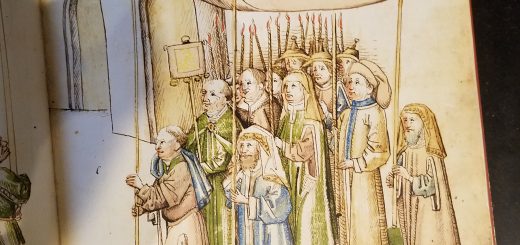Haredim for rent?

8th day of Hanuka
An article of mine titled “Talking about, but without, the ultra-Orthodox” appears today Jan. 2 in the Jerusalem Post. It is a critical piece on the conference this week on “Ultra-Orthodox Jewry and the Holocaust.” There is a general question I raise – can academics be objective? Can a group that academics are studying be objective?
Say you attended a conference on “Female Eskimo Etrog Growers.” Would you be surprised to find that there were no women, no etrog growers, and no Eskimos present? Would it not be bizarre if all the speakers at such a conference were male orange growers from Oregon?
Thus I find it incredible that at two recent conferences in Israel that had to do with haredim there were barely any ultra-Orthodox speakers. After all, haredim are not as rare as female etrog growers in the Arctic…
You might think that during the three days of the conference (January 3-5, in English and Hebrew, in the Gilman Building) there would be more than one token ultra-Orthodox speaker out of a total of 24.
Today there are dozens of ultra-Orthodox scholars in university and college settings throughout the world, and a number of them are working in Holocaust research. Certainly more than one haredi scholar could have been found who would have been able to participate.
The Conference will take place Jan 3,4,5 (3,4,5 b Tevet) at Tel Aviv University (in Ramat Aviv). It is open to the public so you may want to attend all or part of it. Gilman Building Room 496 No reservations necessary, no admission fee.
You can see the program of speakers, times, dates in the website of the Goldstein-Goren Diaspora Research Center of Tel Aviv University.




>Today there are dozens of ultra-Orthodox scholars in university and college settings throughout the world, and a number of them are working in Holocaust research. Certainly more than one haredi scholar could have been found who would have been able to participate.
Who, for example?
Follow the link to her article — she lists several!
I could see Professor Esther Farbstein or Rabbanit David at such a conference. Professor Farbstein’s book on the how Torah Jewry reacted and dealt with the Holocaust deals with many difficult issues such as leaving or staying by Roshei Yeshiva and Admorim, placing kids into monasteries and proves that the story of the 93 Cracow Beis Yaakov girls was a myth. It would have been nice to have Charedi historians present just to show the differences in historiography towards the Shoah. Yet, would those who live according to Daas Torah have been willing to evaluate how Daas Torah functioned before and during the Holocaust by outside academics?
I believe that Tali (Naftali Leowenthal), although Chabad, could be classified as Chareidi, so your entire criticism is faulty.
If you are advocating “affirmative action” to have this (and presumably similiar conferences) include Chareidi representatives then that that is not academia. If are you assuming that academics cannot understand Chareidi communities, culture, or history, than you are opposed to the academic enterprise, and there is nothing more to speak about.
4 b Tevet
There are 24 speakers scheduled, and only one, Dr. Naftali Loewenthal,is haredi.
A year ago when the conference was planned it was suggested to the organizers that Esther Farbstein would be a key person to invite because of her innovative research, high academic standards, and insider understanding. For various reasons, they ignored the repeated suggestions of names of such appropriate haredi scholars.
Esther Farbstein’s 650 page book “B’Seter Ra’am” (in Hebrew, year 2002/5762)- Perspectives on Faith, theology, and Leadership during the HOlocaust – has been translated into English and will be published in about 6 months. I will let you know when it is available in English. MEanwhile, you can get it at Mosad Harav Kook.
Meanwhile I composed a list of several dozen scholars from the yeshiva and Chassidic worlds who are used to presenting at academic conferences. Of course there are many more. For example, there are several young, upcoming scholars from haredi neighborhoods near Jerusalem who are doing doctorates on topics such as the history of the Lithuanian yeshivot. There are Professors Malka and David Schaps (math and classical Greek/Latin, respectively) at Bar Ilan. There is Prof. Zilla-Sinuany Stern (operations research) at BGU and Ariel College. The list goes on and on. You can contact me for specifics.
You are again talking about affirmative action. Have a professor of Math or Systems research present at a conference on history, merely because of the color of their yarmulkah is the lowest form of (reverse) bigotry.
As a follow up to my prior post, Professor Farbstein would have made a superb choice for this conference. I can’t see what relevance and insights a math, Latin, Greek or computers professor would add at a conference dedicated to Charedim and the Holocaust merely because of their being charedi. That’s intellectual tokenism. The real issue is why wasn’t Professor Farbstein invited to speak. Her book is a true masterpieice and is well worth reading in the original and the translation. It is a fantastic exploration of all of the major and controversial issues surrounding religious faith, theology and leadeship during the Holocaust and accomplishes that without passing judgment. Perhaps, she was deemed not PC by the notoriously secular TAU because she refused to place blame at the Gdolim for theirassessment and decision-making and confined herself to reviewing their actions, surveyed the competing positions, etc.